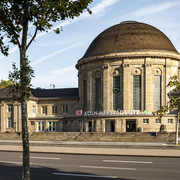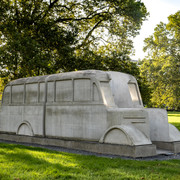Photos & Map
How would you like to arrive?
Details
Useful Information
Nearby
On leaving Deutz station, the eye of anyone arriving in Cologne on the right bank of the Rhine is suddenly drawn to a monument on the landing of the station forecourt, the significance of which is not immediately apparent.
A simple stone pillar is crowned by an original "atmospheric gas engine" with a red protective coating. It is hard to imagine the weight of the pillar, which weighs several tonnes, or the global motorisation without the pioneering contribution of Nicolaus August Otto (14.6.1832 to 26.1.1891). Based on the atmospheric gas engine, Otto developed the first functional four-stroke engine in 1876. Even though his invention was already the subject of patent disputes during his lifetime, particularly with the Austrian Christian Reithmann, the businessman and self-taught Otto prevailed and is generally recognised as the inventor of the Otto engine, which was posthumously named after him. As a result, his name is not only inscribed in the general history of technology, but in particular in Cologne's industrial and economic history.
Erected in 1931 by the Werner-von-Siemens-Ring Foundation and inaugurated by Mayor Konrad Adenauer, the monument on Ottoplatz honours Nicolaus August Otto and engineer Eugen Langen (9.10.1833 to 2.10.1895), as can be seen from the brief inscription on the plinth. With the "N.A. Otto & Cie" factory founded in 1864 in Cologne's Servasgasse behind Cologne's main railway station, the two business partners opened the world's first factory for internal combustion engines. Today's Deutz AG can trace its roots back to this factory.
A simple stone pillar is crowned by an original "atmospheric gas engine" with a red protective coating. It is hard to imagine the weight of the pillar, which weighs several tonnes, or the global motorisation without the pioneering contribution of Nicolaus August Otto (14.6.1832 to 26.1.1891). Based on the atmospheric gas engine, Otto developed the first functional four-stroke engine in 1876. Even though his invention was already the subject of patent disputes during his lifetime, particularly with the Austrian Christian Reithmann, the businessman and self-taught Otto prevailed and is generally recognised as the inventor of the Otto engine, which was posthumously named after him. As a result, his name is not only inscribed in the general history of technology, but in particular in Cologne's industrial and economic history.
Erected in 1931 by the Werner-von-Siemens-Ring Foundation and inaugurated by Mayor Konrad Adenauer, the monument on Ottoplatz honours Nicolaus August Otto and engineer Eugen Langen (9.10.1833 to 2.10.1895), as can be seen from the brief inscription on the plinth. With the "N.A. Otto & Cie" factory founded in 1864 in Cologne's Servasgasse behind Cologne's main railway station, the two business partners opened the world's first factory for internal combustion engines. Today's Deutz AG can trace its roots back to this factory.
Useful Information
Eligibility
Suitable for any weather
for Groups
for Class
for families
for individual guests
Suitable for the Elderly
Parking facilities
Ottoplatz is located in front of the 'Köln Messe/Deutz' railway station. The station is connected to the long-distance and local railway network of Deutsche Bahn. Various other stations in Cologne and the region can be reached by Deutsche Bahn S-Bahn trains. The station is easily accessible via the city centre public transport network. Light rail lines 1, 3, 4 and 9 serve the station, making it easy to travel on to other parts of the city.
Nearby











